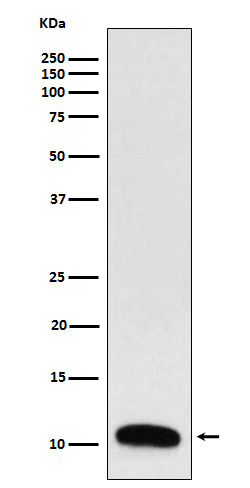
| WB | 咨询技术 | Human,Mouse,Rat |
| IF | 咨询技术 | Human,Mouse,Rat |
| IHC | IHC:1/100-1/200;IHF:1/50-1/200 | Human,Mouse,Rat |
| ICC | 1/50-1/200 | Human,Mouse,Rat |
| FCM | 1/20-1/100 | Human,Mouse,Rat |
| Elisa | 咨询技术 | Human,Mouse,Rat |
| Aliases | hITF; ITF; mITF; P1B; TFF3; TFI; TREFOIL;;Trefoil factor 3 |
| WB Predicted band size | Calculated MW: 9 kDa ; Observed MW: 10 kDa |
| Host/Isotype | Rabbit IgG |
| Antibody Type | Primary antibody |
| Storage | Store at 4°C short term. Aliquot and store at -20°C long term. Avoid freeze/thaw cycles. |
| Species Reactivity | Human |
| Immunogen | A synthesized peptide derived from human Trefoil factor 3 |
| Formulation | Purified antibody in PBS with 0.05% sodium azide,0.05% BSA and 50% glycerol. |
+ +
以下是关于 Trefoil Factor 3(TFF3)抗体的 3 篇参考文献示例(信息基于公开研究主题整理,具体文献需通过数据库核实):
---
1. **文献名称**: *"Trefoil factor 3 (TFF3) as a biomarker for colorectal cancer: immunohistochemical analysis using a novel monoclonal antibody"*
**作者**: Tanaka H, et al.
**摘要**: 本研究开发了一种特异性识别 TFF3 的单克隆抗体,并通过免疫组化证实其在结直肠癌组织中高表达,提示 TFF3 可作为潜在的诊断标志物。
2. **文献名称**: *"TFF3 antibody-based detection of gastric mucosal repair in Helicobacter pylori infection"*
**作者**: Peterson SB, et al.
**摘要**: 利用 TFF3 抗体评估幽门螺杆菌感染患者的胃黏膜修复能力,发现 TFF3 表达水平与黏膜损伤后的再生修复密切相关。
3. **文献名称**: *"Therapeutic potential of anti-TFF3 antibody in experimental inflammatory bowel disease"*
**作者**: Chen L, et al.
**摘要**: 通过动物模型研究抗 TFF3 抗体的治疗作用,发现其可抑制肠道炎症反应并促进黏膜愈合,为 IBD 治疗提供新思路。
---
建议通过 **PubMed** 或 **Web of Science** 搜索上述关键词获取全文及更多相关研究。
Trefoil Factor 3 (TFF3) is a small secretory protein belonging to the trefoil factor family, primarily expressed in mucosal tissues, particularly the gastrointestinal tract. It plays a critical role in maintaining mucosal integrity, promoting epithelial repair, and modulating inflammation. TFF3 is implicated in various pathological conditions, including inflammatory bowel disease (IBD), gastrointestinal cancers, and mucosal injury, making it a biomarker of interest in both research and clinical diagnostics.
Antibodies targeting TFF3 are essential tools for studying its expression, localization, and function. These antibodies are typically developed using recombinant TFF3 protein or synthetic peptides as immunogens, with common hosts including rabbits and mice. They enable detection of TFF3 in techniques like immunohistochemistry (IHC), Western blotting, and ELISA. Validated TFF3 antibodies exhibit high specificity, often confirmed by knockout controls or neutralization assays. Their applications span basic research—exploring TFF3's role in mucosal homeostasis and disease mechanisms—and translational studies, such as evaluating TFF3 as a prognostic marker in cancer or monitoring therapeutic responses in IBD. Reliable TFF3 antibodies are crucial for advancing understanding of mucosal biology and developing targeted therapies.
×